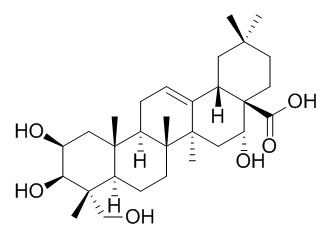Polygalacic acid
Polygalacic acid may exert a significant neuroprotective effect on cognitive impairment, driven in part by the modulation of cholinergic activity and neuroinflammation. Polygalacic acid shows significant postingestive effects on Spodoptera littoralis larvae.
Inquire / Order:
manager@chemfaces.com
Technical Inquiries:
service@chemfaces.com
Tel:
+86-27-84237783
Fax:
+86-27-84254680
Address:
1 Building, No. 83, CheCheng Rd., Wuhan Economic and Technological Development Zone, Wuhan, Hubei 430056, PRC
Providing storage is as stated on the product vial and the vial is kept tightly sealed, the product can be stored for up to
24 months(2-8C).
Wherever possible, you should prepare and use solutions on the same day. However, if you need to make up stock solutions in advance, we recommend that you store the solution as aliquots in tightly sealed vials at -20C. Generally, these will be useable for up to two weeks. Before use, and prior to opening the vial we recommend that you allow your product to equilibrate to room temperature for at least 1 hour.
Need more advice on solubility, usage and handling? Please email to: service@chemfaces.com
The packaging of the product may have turned upside down during transportation, resulting in the natural compounds adhering to the neck or cap of the vial. take the vial out of its packaging and gently shake to let the compounds fall to the bottom of the vial. for liquid products, centrifuge at 200-500 RPM to gather the liquid at the bottom of the vial. try to avoid loss or contamination during handling.
Tropical J. of Pha. Research2017, 16(3):543-552
Russian J. Bioorganic Chemistry2024, 50:2897-2903.
Journal of Plant Growth Regulation2022, 10705-2.
HortTechnology2016, 26(6):816-819
J Int Med Res.2021, 49(7):3000605211032849.
Journal of Functional Foods2022, 98:105271.
Plant Physiol Biochem.2023, 201:107795.
J Ginseng Res.2023, 47(4):593-603.
Natural Product Communications2023, 18(9).
Metabolites.2020, 11(1):E11.
Related and Featured Products
J Nat Prod. 2010 Nov 29;73(11):1863-7.
Antiproliferative effects of saponins from the roots of Platycodon grandiflorum on cultured human tumor cells.[Pubmed:
20939516]
METHODS AND RESULTS:
Three new triterpenoid saponins, platyconic acid B lactone (1), deapio-platyconic acid B lactone (2), and deapio-platycodin D(2) (3), together with 17 known triterpenoid saponins, were isolated from a root extract of Platycodon grandiflorum. The structures of 1-3 were determined on the basis of spectroscopic data interpretation and chemical transformation.
CONCLUSIONS:
Saponins with a platycodigenin or Polygalacic acid unit as a sapogenin demonstrated significant inhibitory effects on the proliferation of a small panel of cultured human tumor cells.
Phytochemistry. 2011 Jun;72(8):743-51.
Bioactive saponins from Microsechium helleri and Sicyos bulbosus.[Pubmed:
21439597 ]
Eleven oleanane-type saponins (1-11) have been isolated from Microsechium helleri and Sicyos bulbosus roots and were evaluated for their antifeedant, nematicidal and phytotoxic activities.
METHODS AND RESULTS:
Saponins {3-O-β-D-glucopyranosyl (1→3)-β-D-glucopyranosyl-2β,3β,16α,23-tetrahydroxyolean-12-en-28-oic acid 28-O-α-L-rhamnopyranosyl-(1→3)-β-D-xylopyranosyl-(1→4)-[β-D-xylopyranosyl-(1→3)]-α-L-rhamnopyranosyl-(1→2)-α-L-arabinopyranoside} (1), and {3-O-β-D-glucopyranosyl-2β,3β,16α,23-tetrahydroxyolean-12-en-28-oic acid 28-O-α-L-rhamnopyranosyl-(1→3)-β-D-xylopyranosyl-(1→4)-[β-D-xylopyranosyl-(1→3)]-α-L-rhamnopyranosyl-(1→2)-α-L-arabinopyranoside} (2) were also isolated from M. helleri roots together with the two known compounds 3 and 4. Seven known structurally related saponins (5-11) were isolated from S. bulbosus roots. The structures of these compounds were established as bayogenin and polygalacic glycosides using one- and two-dimensional NMR spectroscopy and mass spectrometry. Compounds 7, 10, bayogenin (12) and Polygalacic acid (13) showed significant (p<0.05) postingestive effects on Spodoptera littoralis larvae, compounds 5-11 and 12 showed variable nematicidal effects on Meloydogyne javanica and all tested saponins had variable phytotoxic effects on several plant species (Lycopersicum esculentum, Lolium perenne and Lactuca sativa).
CONCLUSIONS:
These are promising results in the search for natural pesticides from the Cucurbitaceae family.
Phytomedicine. 2016 Feb 15;23(2):149-55.
Neuroprotective effects of polygalacic acid on scopolamine-induced memory deficits in mice.[Pubmed:
26926176 ]
Polygala tenuifolia Willd is a Traditional Chinese Medicine used for the treatment of learning and memory deficits.
METHODS AND RESULTS:
Triterpenoid saponins, the main bioactive compounds of Polygala tenuifolia Willd, are easily hydrolyzed to Polygalacic acid (PA).Treatment with scopolamine significantly increased the escape latency time, decreased the number of crossings, and shortened the time spent in the target quadrant, while PA reversed these scopolamine-induced effects. PA significantly improved cholinergic system reactivity, as indicated by decreased acetylcholinesterase (AChE) activity, increased choline acetyltransferase (ChAT) activity, and elevated levels of acetylcholine (ACh) in the hippocampus and frontal cortex. PA also significantly ameliorated neuroinflammation and oxidative stress in mice.
CONCLUSIONS:
These results suggest that PA might exert a significant neuroprotective effect on cognitive impairment, driven in part by the modulation of cholinergic activity and neuroinflammation.



